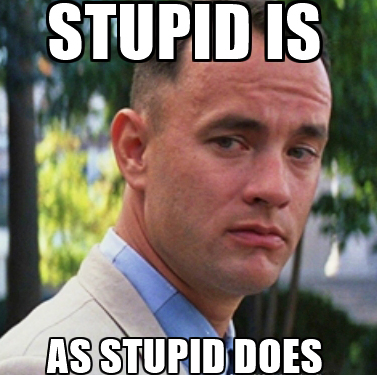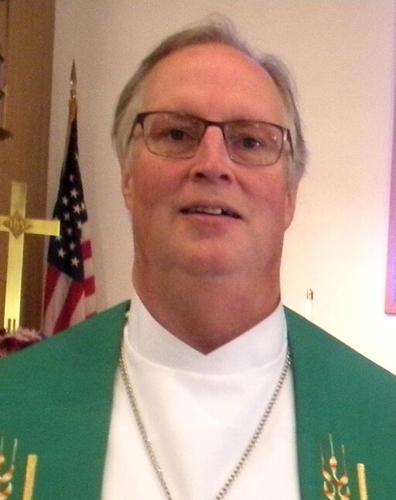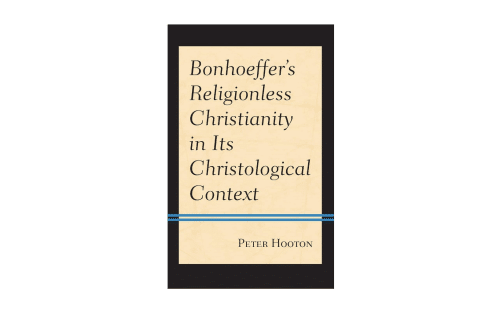You are currently browsing the category archive for the ‘Bonhoeffer for the Twenty-First Century’ category.
GTO Poker Theories – Bonhoeffer’s Theory of Stupidity
You want them at your table, but stupid players are a lot more unpredictable and should be approached with caution.

One of the real gifts poker has given me is that it has been a great jumping off point to learn things from other disciplines like economics, AI, psychology and Game Theory. So here is a series of articles where I bring some of the most interesting things I have learned from other subjects outside of poker which are applicable in this game we know and love.
Dietrich Bonhoeffer was a German theologian and pastor who is known for his contributions to theology and his resistance to the Nazi regime during World War II. Bonhoeffer developed a theory of stupidity that he referred to as “stupidity as sin.”
According to Dietrich Bonhoeffer, stupidity can be more dangerous than evil because it is harder to defend against. While it is possible to take action against evil individuals, those who are stupid may not be receptive to reasoning and may ignore any attempts to protest or fight against them. As a result, people who are caught up in their own narrow perspectives and refuse to consider alternative viewpoints can be particularly difficult to oppose.
Against stupidity we have no defense. Neither protests nor force can touch it. Reasoning is of no use. Facts that contradict personal prejudices can simply be disbelieved — indeed, the fool can counter by criticizing them, and if they are undeniable, they can just be pushed aside as trivial exceptions. So the fool, as distinct from the scoundrel, is completely self-satisfied. In fact, they can easily become dangerous, as it does not take much to make them aggressive. For that reason, greater caution is called for than with a malicious one. Never again will we try to persuade the stupid person with reasons, for it is senseless and dangerous. — Dietrich Bonhoeffer
Bonhoeffer argued that it was stupidity that led to the rise of Hitler. In modern times some of the extreme responses to COVID and climate change, or some of the more bizarre election results, could easily fall into this rubric.
It’s hard to range a donkey

Obviously the examples above are all incredibly serious with potentially grave consequences. Not to trivialise those, there is an obvious poker parallel to be made, which is that stupid players are in some ways harder to play against.
You can predict what a weak regular is going to do and usually put them on a reliable range of hands. In a 3-bet pot on a 2-7-K flop you don’t really have to worry about them having bottom two pair, for example. Against a complete donkey, however, nothing is out of the question.
Christian nationalism and the far right
We must stand up to, and speak out against, Christian nationalism, especially when it inspires acts of violence and intimidation.
By Dr. Ellen Kennedy, the Rev. John Matthews & the Rev. James Erlandson

Sophie Scholl was beheaded by guillotine in Munich, Germany at the age of 21.
Her crime? Speaking out against the Aryan white supremacy of the Nazi regime.
It was 1943. Sophie was a member of the White Rose, a clandestine group of university students who were distributing leaflets at universities throughout Germany urging resistance to the Third Reich.
A janitor saw Sophie dropping leaflets off a balcony railing into a central hallway at the University of Munich, and he turned her in to the Gestapo. She was arrested, imprisoned, beaten, and murdered four days later.
After the execution, a pro-Nazi rally was held at the university, and the janitor was given a standing ovation.
“Such a fine, sunny day, and I have to go,” Sophie said, before she was guillotined. “But what does my death matter, if through us thousands of people are awakened and stirred to action?”
Dietrich Bonhoeffer was a Lutheran pastor and theologian who became a leader in what was known as the Confessing Church, which opposed German Christian policies of exclusion and marginalization. He was involved in a conspiracy to assassinate Hitler that culminated in a failed coup on July 20, 1944. As a consequence, he was imprisoned for two years and sentenced to death at a court-martial in Flossenbürg concentration camp in Germany.
On April 9, 1945, he was led naked into the execution yard and hanged. His crime? He would not subvert Christianity to a religion that put Hitler ahead of God. He believed that the German Protestant church failed to stand up against the evils of Nazism and he stood in solidarity with the victims.
Sophie Scholl and Dietrich Bonhoeffer have become heroes in the pantheon of “upstanders” against the Christian nationalism of Nazi Germany.
What is Christian nationalism?
As Georgetown University political science professor Paul D. Miller described in Christianity Today, “Christian nationalism is the belief that the American nation is defined by Christianity, and that the government should take active steps to keep it that way. Christian Nationalists assert that America is and must remain a ‘Christian nation’ – not merely as an observation about American history, but as a prescriptive program for what America must continue to be in the future.”
We’ve all seen T-shirts proclaiming, “Jesus Christ is my savior and Donald Trump is my president.” This is an example of Christian nationalism.
History repeats
By Burt Baldwin, Ignacio
When I attended seminary many years ago, I was struck by the works of Dietrich Bonhoeffer. Reverend Bonhoeffer was a German Lutheran minister, theologian and activist. He is best known for his work, “The Cost of Discipleship,” which was published in the 1930s. Dietrich was known for his staunch resistance to the Nazi dictatorship and Adolf Hitler. He spoke, without fear, against the regime’s euthanasia program and the persecution of the Jews.
As a result, he was imprisoned in April 1943. He was sent to Tegel Prison, and later, transferred to the Flossenburg concentration camp.
Nearly a month before the liberation of Europe, in April 1945, Dietrich was accused in the conspiracy to assassinate Adolf Hitler, which was known as the “July 20 Plot.” Less than a month before the end of the war, Bonhoeffer was stripped of his clothes, ordered up to the gallows and hung.
Dietrich was one of the few people who could see what fascism was doing to his country. He witnessed the destruction of Jewish cemeteries and the rampaging of Jewish businesses during the riots of “Kristallnact,” also known as the night of the broken glass. He watched as Jewish citizens were harassed, beaten and raped. Synagogues were burned. Jews had to register their businesses, which were later confiscated. Jewish professors were banned from universities. Jewish children were ordered to attend only Jewish schools. Book burning became a national event.
The ultimate humiliation was the ordering of Jews to wear a gold star when appearing in public. Of course, this was to be followed by the Holocaust.
There is an old adage that alludes to history repeating itself. It may be true, for it only takes time for people to forget or deny the past. I have recalled some similar events in the past years, which puts me on edge and should sober us all – that history can indeed be repeated.
We have had numerous hate crimes and murders in Jewish synagogues, we have had racist marches and the destruction of Jewish cemeteries. We have had legislation for voter suppression and gerrymandering of voting districts. We have had book-burning sessions and censorship of literature by right-wing groups.
We have had propagandist media companies spewing lies to the public. We have had politicians denying the results of our voting system. We have had professional athletes and entertainment stars embracing anti-Semitic hate speech.
There is another old adage that “those who ignore the lessons of the past are doomed to repeat them.”
It is time to self-examine who we are and what we want the future to look like for us and our children.
Koinonia – Is faith a minimum or maximum?

Often in life, we are tempted to ask, “What is the minimum?” “I don’t like housecleaning, and so, what is the minimum amount of work I need to do?” This choice doesn’t seem to involve a lot of consequences.
But, with the ice fishing season approaching, people can try to discover what the minimum amount of ice is needed to walk out or drive on the lake. There the outcomes are more serious.
Considering faith, what’s the minimum there? What do I need to know and believe? What is the minimum amount of work I should do? Whenever we seek to measure things in the Bible, we are delving into the area of God’s law. Yet, his law is quite strict and certain.
Once a rich young ruler asked Jesus, “What must I do to inherit eternal life?” He was trying to find the minimum to reassure himself. Jesus pointed to the ten commandments as a summary of God’s Law. But the man thought he had done it all. Then, Jesus showed him the cost of salvation saying, “‘Sell all that you have and distribute to the poor, and you will have treasure in heaven; and come, follow me.’ But when he heard these things, he became very sad, for he was extremely rich.”
The point is that there is no minimum. There is always one thing more in life that we need to do to save ourselves according to the Law. Thus, in the sermon on the mount, Jesus said, “You therefore must be perfect, as your heavenly Father is perfect.” The demands of the Law are certainly well beyond our capabilities. And thus, according to the Law we deserve only judgment.
Yet, some would turn the gospel into a new law by making it the new minimum. They say, “All you have to do is believe.” But this makes the gospel into “cheap grace.” Dietrich Bonhoeffer coined this term about 85 years ago. He wrote, “Cheap grace is the grace we bestow on ourselves. Cheap grace is the preaching of forgiveness without requiring repentance, baptism without church discipline, Communion without confession. … Cheap grace is grace without discipleship, grace without the cross, grace without Jesus Christ, living and incarnate.”
The gospel is not a new law giving us a new minimum. Rather, the gospel is about the costly grace given to us in Jesus who fulfilled the Law perfectly.
The Courage to Make Righteous Choices
Let your faith make a difference in your choices.

Blessed are those who are persecuted because of righteousness, for theirs is the kingdom of heaven. Matthew 5:10 (NIV)
This isn’t my favorite beatitude, but it’s an important one. As a Christian I like to focus on all that I gain by following Jesus: eternal life, a restored relationship with God, a life of meaning and purpose, a heart of worship, His friendship and guidance, peace that surpasses understanding.
But Jesus has always been honest that following Him on the path of right choices will sometimes cause suffering. Even small choices can require sacrifices. Giving the right of way to the car merging into your lane. Returning the money when a cashier gives too much change. Biting your tongue and changing the subject when someone starts to share juicy gossip. Dietrich Bonhoeffer wrote The Cost of Discipleship, in which he challenged Christians to let their faith make a difference in their choices—large and small. Bonhoeffer faced persecution, including imprisonment and death, for taking a stand against Hitler.
I may never face such heroic choices…
Dietrich Bonhoeffer would have reacted in similar fashion. “The physical presence of other Christians is a source of incomparable joy and strength to the believer” (Life Together)
By Jonathan Leeman (9Marks)
03.05.2021

Some will think this is insensitive, some will think it’s overdue, but I want to make sure it’s said: not physically gathering with the church hurts you spiritually. So, pandemic-weary Christian, work to gather again with your church, even if your church continues to offer a virtual option. Likewise, pandemic-weary pastor, gently encourage your pandemic-weary congregation to gather as soon as they can.
A WORD FOR MEMBERS
To Christians, let me admit, I don’t know your situation. I don’t know the laws you’re under or what health risks remain for you personally. Therefore, with a general-audience article like this one, I want to leave space for differing circumstances and consciences. Providential hindrances are real. If the flu keeps you home from work, you stay home and shouldn’t feel guilty. At the same time, you know that staying home from work, over time, hurts your job. So you get back to work as soon as you can.
Likewise, as you think through your own church-attendance situation, hopefully in conversation with your pastors, maybe you remain providentially hindered from attending. The Lord shows mercy and grace. He makes provision for the stranded, the soldier, the shut-in, and the high-risk senior saint.
But as you weigh out all the variables, I want to leave a pebble in your shoe. If you can’t attend, I want you to be a little frustrated that you can’t attend, lest you get comfortable. If you’re not frustrated, something’s wrong. The Lord has commanded us not to forsake the assembly (Heb. 10:25). And absence from the gathering does affect our spiritual state, even if we have a legitimate reason for not attending, like being sick or quarantined. Jesus designed Christianity and the progress of our discipleship to center around gatherings. The math is therefore simple: Gathering with the church is spiritually good for you. Not physically gathering with the church spiritually hurts you.
A WORD FOR PASTORS
To pastors, let me say, I’m raising the topic now—in the winter of 2021—because I’m hearing from some of you that a few of your members have grown complacent. You’re telling me that members aren’t attending when they probably could. They’re a little too comfortable with the virtual option.
Indeed, this is why some churches never offered the live-stream service in the first place. They didn’t want to risk encouraging an appetite for a much-less-healthy substitute.
F. BURTON NELSON
Franklin Fisher (1906–1960)
When Dietrich Bonhoeffer arrived for the 1930–31 academic year at Union Theological Seminary in New York, he had encountered few blacks during his life. Early in his Union days, he met Franklin Fisher, a black student from Birmingham, Alabama. Fisher was assigned to the Abyssinian Baptist Church for his field work, and Bonhoeffer accompanied him there. During the spring term, Bonhoeffer helped teach a Sunday school class.
Through Fisher, Bonhoeffer gained “a detailed and intimate knowledge of the realities of Harlem life,” according to Eberhard Bethge. On one occasion Bonhoeffer and Fisher were together in a restaurant, and it became clear that Fisher would not be extended the same service. In disgust, Bonhoeffer led the party outside in protest.
After 1931, the two friends did not meet again, but Bonhoeffer spoke of Fisher to his Finkenwalde students, to his family, and others. Wolf-Dieter Zimmermann, one of those students, reports that after an evening of playing Negro spirituals, Bonhoeffer said: “When I took leave of my black friend, he said to me: ‘Make our sufferings known in Germany, tell them what is happening to us, and show them what we are like.’ I wanted to fulfill this obligation tonight.”




Recent Comments